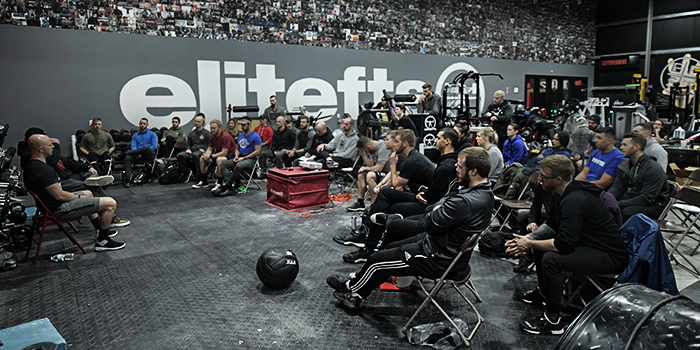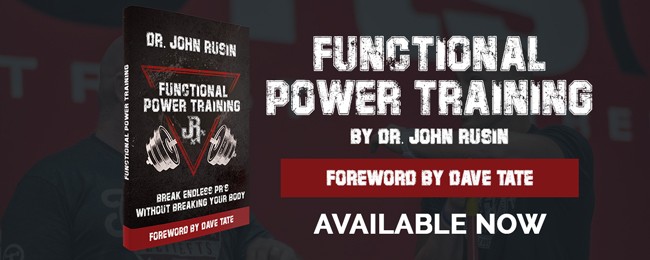
From December 15 to 16, The Pain-Free Performance Training System seminar with Dr. John Rusin took place at elitefts' S5 Compound.
During this two-day event, John taught what he calls his blueprint to success — a hybrid approach that combines both sports performance training and injury prevention practices, using various methods with screenings, assessments, coaching, and programming.
We took this opportunity to have a Q&A with Dave Tate and Dr. John Rusin to share their overall experiences with video series Fixing Dave Tate and Breaking John Rusin, and more. In this Q&A session, you'll learn the answers to these questions:
Is Dave still following Dr. Rusin’s protocol? (2:05)
In a word:
"Kinda."
Since Dave’s been training from age 12 until the year 2005, so he knows his limitations. At the very least, he does follow protocol for warm-ups.
John warns that even then, it’s important to be careful. It’s still possible to overtrain from warm-ups. Sometimes it’s OK to take a step back from training.
Dave adds it’s important to be observant of the athletes, especially in terms of non-verbal communication. The obvious could be right in front of you, but you could miss it from looking at the smaller details.
What are your top-two takeaways from training with one another? (13:00)
For Dave, the Number One was the 90-90 cooldown. For him, it made a huge difference. In second place: Reinforcing the warm-up as something more than just a movement he was training.
For John, it was utilizing a base far better than he thought possible. It wasn’t until Dave taught him a bracing mechanism that helped him link his core, which helped him get some PRs. The second was being able to strain through larger degrees of ranges of motions without losing his position. Having been a twitch-based athlete all his life, he never liked straining and doing reps. (Dave mutters, “It’s the best fucking part.”)
RELATED: Top 5 Lessons I've Learned as a Coach
While training together, Dave and John both learned to look past their different areas of expertise, personal biases, and both of them became better lifters through it.
John stresses the importance of learning from professionals who share similar goals, even if they’re in a different part of the industry and have a different view on things. Keep people like that in your network and learn from them.
Is there anything now, with all of the experience Dave’s had, that he would tell himself or have done a little bit differently? (26:12)
In yet another one-word answer from Dave:
No.
Dave says that he was fortunate and blessed to be put in a position with the people who taught him. He’d gone 10 years without a sports-related injury, and he believes that’s due in part to the people who taught him and gave him advice.
John, like Dave, was also put in a good position. He didn’t go train with people right away, though; for six months, he sat back and watched them before getting into the training. He says he never had a bad experience with a coach, and as a result, he never had to re-learn anything. He was told the proper way to do things, and he did them. It’s the little things that matter.
Dave adds that he sought out the strongest people in the gym and learned from them until he surpassed them. Then, he’d move on to a place that had stronger people and learn from them, too. He did that until he got “stuck” at Westside Barbell, where he wasn’t able to become the strongest. But he still learned from the strongest and coached some of the younger, weaker people in the gyms.
What are some of the biggest programming upgrades both of you have seen that people benefit from, as a coach/trainer in general and for powerlifters? (35:23)
From Dave’s perspective, teaching other people to train themselves and to train others is one of those things. He shares something that Louie Simmons taught him: If someone’s in your weight class and they’re struggling, it’s your job to help that person out. If they surpass you, that’s great. That means they’ll pay it forward to someone weaker than them.
As a physical therapist, John has a different perspective. He’s seeing a trend in the industry of people being afraid of strength training. There’s a misconception that strength is dangerous and strength is what’s going to end up breaking a person. He’s seen it all over: physical therapy, commercial gyms, and even professional athletes. And the thing is, people need strength. It’s the top physical characteristic that all other physical characteristics rely on.
On one end of the spectrum, you’ve got Mike Boyle doing mostly unilateral work, and on the other end, you’ve got Mark Rippetoe saying single-leg work, and I wanted to know what Dave thought. (44:05)
Dave doesn’t care. He says that neither of these guys is stupid. People don’t know the full context of all of this stuff, and people tend to position themselves with hard statements. For Dave, it’s good entertainment, but nothing else useful to him. He has nothing to gain by coming out and saying something stupid online. It’s better for him to go out and share information that actually helps people.
WATCH: Table Talk — Agreeing to Disagree with Mark Rippetoe
John suggests that anything can work for anyone, but not everything will work everyone. Basically, personalization is paramount.
John, you travel a lot. Do you have a sleep protocol? (53:37)
"Sleep is the number one recovery tool in the world."
John explains that there is no substitute for sleep... then admits that he’s still trying to figure out the balancing act of sleep and traveling for seminars.
Dave never did figure out how to sleep with travel, and, in his words, it fucked up his training in a big way, though he owns up to getting plenty of sleep, though the quality probably could’ve been better.
Disclosure
Neither elitefts.com Inc. nor Dave Tate has any affiliation with this program or book. Neither elitefts nor Dave Tate has been compensated or been involved in the development of this product, outside of the foreword written by Dave Tate. John Rusin was compensated for his time working with Dave Tate as well as his time and travel for the filming of Fixing Dave Tate and Breaking John Rusin series. elitefts was not compensated for hosting the John Rusin Certification at the elitefts facility in December 2018, where the above Q&A was recorded.
Dave Tate hired John Rusin to help with some issues he was having, to film the second video series, and offered the elitefts facility as for the location for the certification.
elitefts has always been forward about all endorsements and will note involvement in every case.
elitefts and Dave Tate feel that John Rusin’s education and experience are of value to the user and industry.









